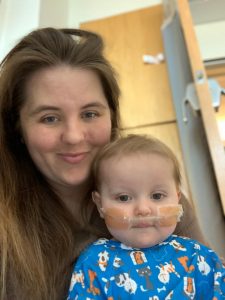Mothers of Children With PH Share Their Experiences With Transplant Ineligibility
Written by |

Can you imagine being denied something that could prolong your life?
In a previous column, I interviewed adult pulmonary hypertension (PH) patients who are ineligible for transplant. Their responses were open, honest, and mature. But what if the patient is a child? How do parents cope with that kind of news?
Lisa Garnett’s daughter Branda was 13 when she was diagnosed with PH in 2007. Evaluation for transplant was suggested, but Lisa wanted time to consider such a serious decision before putting her daughter through the process.
“Branda has significant developmental delays. She functions at approximately 8 years of age, doesn’t comprehend time, actions, or consequences. Branda will never be independent and requires 24/7 support,” Lisa wrote in an email.
Lisa manages her daughter’s central line plus her PH medications, and her epilepsy, which remains uncontrolled despite aggressive treatments. She could not imagine explaining transplant to Branda and why her daughter would have to willingly accept and endure everything involved.
“I think the decision to pursue transplant is incredibly personal,” Lisa wrote.
Branda’s quality of life has always trumped quantity. Expecting Branda to go through the transplant process seems traumatic and cruel to Lisa.
“I felt my decision to push it would be selfish,” she added.
Lisa understands those who think nothing is out of bounds when it comes to saving a loved one. But she advises: “Reflect on your child, their mental state, level of comprehension, and desires. Ask yourself what is your motivation? Is it to save your child or avoid the pain of their loss?”
Lisa realizes she likely will outlive her daughter. She has accepted this by embracing their time together while Branda is as happy and healthy as possible.
Lisa urges others to find moments of joy to sustain them and to seek out supportive people.
“No one can truly comprehend all the facets of your grief,” she wrote. “Those who fully support and love you will be there when you need them. Lastly, if you have faith, hold on to it tightly and firmly.”
Kathryn Leffers’ son Grayson, 2, was denied listing last year due to high panel reactive antibodies (PRA). According to Montefiore Medical Center, “The PRA score is expressed as a percentage, which can range from 0 to 99 percent, that represents the likelihood of your blood having an antibody against a particular donor.”
Grayson reacts to almost all of the 100 commonly found antigens. It would be nearly impossible to find a suitable organ, and his risk of immediate and long-term rejection would be high. It would be unfair to list him with little to no hope of finding a matching donor.
Hearing that Grayson is ineligible made Kathryn feel physically ill.
“Coming to terms with my baby needing a transplant was difficult. But knowing he can’t have it is an indescribable feeling. I wanted to pick him up, hold him and make everything go away,” Kathryn wrote in an email.
Kathryn finds comfort from people who validate her feelings instead of questioning them.
“Finding those people has changed this journey from being dark and lonely to being filled with hope and trust,” she wrote.
She advises others to take a breath, ask questions, and know your options. “It’s OK to be mad and disappointed. It’s OK to not be OK. Just make sure you let it out.”
Kathleen Reeves’ daughter Zoe, 7, was diagnosed in 2018 with chronic thromboembolic pulmonary hypertension (CTEPH), a form of PH that is rare, especially among children.
Kathleen wrote that a surgical procedure called pulmonary thromboendarterectomy (PTE) can remove blood clots from the arteries in the lungs. This makes CTEPH the only curable form of PH. Unfortunately, Zoe is not a surgical candidate.
Zoe also has osteogenesis imperfecta type 3, commonly referred to as brittle bone disease. She is small and has suffered dozens of broken bones.
PTE is a long and extensive open-chest surgery involving heart-lung bypass and repeated circulation cessations. Zoe’s dual conditions present too high a risk. She most likely would not survive PTE surgery or transplant.
Kathleen worries about the “what ifs” of accepting ineligibility. “What if we are overstating her fragility and underestimating her resilience?” she pondered.
Kathleen seeks stories and information that affirm their decision. She admits, “I feel perversely gratified when I read someone’s story of PTE surgical complications. Somehow, I am reassured that Zoe would surely not have survived such surgical trauma.”
But success stories remind her that a cure exists. They prompt her to revisit their decision.
“Ultimately I re-arrive at the same conclusion and comfortably lean into the understanding that Zoe has a reduced lifespan,” she wrote.
Kathleen reminds herself that Zoe’s medical complexity makes her ineligibility a reality, not a choice. Recognizing that her daughter’s condition is no one’s fault helps Kathleen stay centered. It opens her heart to “be with” Zoe in the moments that matter so she can live her life for as long as it is meant to be.
She views anything that provides Zoe with more time and greater quality of life as a gift. Without modern medications and technology, her daughter would have already died.
Kathleen concluded, “Zoe’s ‘natural’ life course is to have two rare diseases and live less long than most of her peers. That is not wrong. It simply is.”
***
Note: Pulmonary Hypertension News is strictly a news and information website about the disease. It does not provide medical advice, diagnosis, or treatment. This content is not intended to be a substitute for professional medical advice, diagnosis, or treatment. Always seek the advice of your physician or other qualified health provider with any questions you may have regarding a medical condition. Never disregard professional medical advice or delay in seeking it because of something you have read on this website. The opinions expressed in this column are not those of Pulmonary Hypertension News or its parent company, Bionews, and are intended to spark discussion about issues pertaining to pulmonary hypertension.






Leave a comment
Fill in the required fields to post. Your email address will not be published.